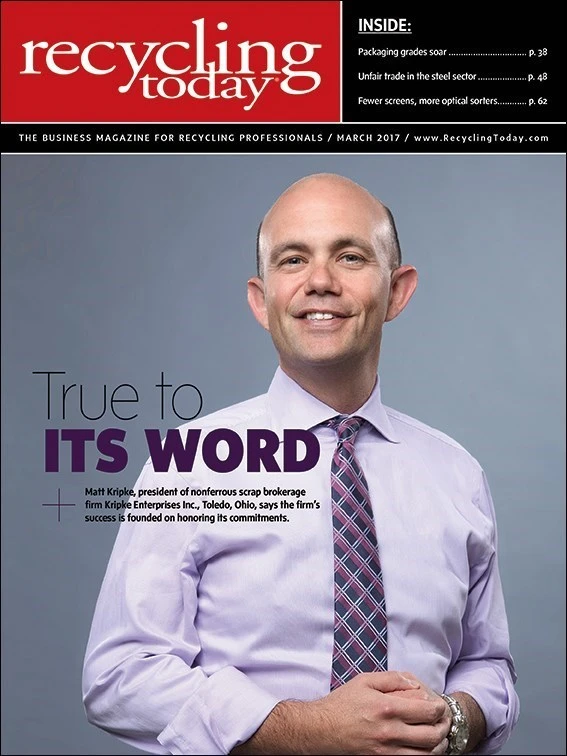Study examines recycling availability

Of the 2,500 communities studied in the “2015-16 Centralized Study of Availability of Recycling,” 73 percent of U.S. consumers had access to curbside recycling, while 21 percent had access to drop-off recycling programs, meaning 94 percent of U.S. consumers have access to recycling. However, only 60 percent of consumers have curbside receptacles for their recyclables, according to Adam Gendell of the Sustainable Packaging Coalition (SPC), who added that that information is very different from the 94 percent of consumers who have access to recycling.
In a Jan. 12, 2017, webinar hosted by Plastics Industry Association, Washington, Gendell, associate director of the SPC, a project of GreenBlue, Charlottesville, Virginia, presented the findings of this study, which looked at the availability of recycling programs in the United States and the types of packaging accepted in those programs. RRS, Ann Arbor, Michigan, and Moore Recycling Associates Inc., Sonoma, California, prepared the report, which SPC commissioned.
Of the 73 percent of consumers with access to curbside recycling programs, 53 percent are “automatically” provided recycling services, while the other 20 percent must subscribe or opt-in to their communities’ recycling programs, the study reveals.
Gendell said, “If there are hoops to jump through, about 1 in 3 households will do so.”
Only 21 percent of the population live in communities that include multifamily units in curbside programs, he added.
Of the communities with curbside recycling programs, 53 percent were automatic municipal programs, while 6 percent were voluntary municipal programs and 14 percent were hauler-based programs that charged a fee to recycle, according to the study’s findings.
Eighty-nine percent of the curbside recycling programs used single-stream collection, prompting Gendell to say, “Single stream is still here to stay.” Additionally, 44 percent of curbside recycling programs used rolling carts, which he said “result in a pronounced increase in recyclables delivered to the MRF.”
Furthermore, the study’s findings into the acceptance of 49 types of packaging in recycling programs help to substantiate recyclability claims on packaging in compliance with the U.S. Federal Trade Commission’s guidance for environmental marketing claims. National acceptance rates for every packaging type studied are given in broadened figures in the report, and detailed information on acceptance rates is presented in a series of reports issued to the various project partner organizations, the SPC says.
Of the packaging studied, the following can be recycled by 60 percent or more of consumers:
- PET (polyethylene terephthalate), HDPE (high-density polyethylene), PP (polypropylene), LDPE (low-density polyethylene), LLDPE (linear-low-density polyethylene), PVC (polyvinyl chloride) and other bottles/jugs and jars;
- bottle caps;
- PET cups, containers/trays, clamshells and lids;
- PP cups, tubs/containers (including buckets smaller than 5 gallons) and clamshells;
- LDPE/LLDPE tubs (including buckets smaller than 5 gallons);
- aluminum beverage cans;
- glass beverage bottles;
- aluminum and steel aerosol cans; and
- steel food cans.
Packaging that can be recycled by 20 to 60 percent of the population includes:
- PP and LDPE/LLDPE lids;
- PVC nonbottle rigid packaging (blisters/formed packaging);
- PVC clamshells;
- PS clamshells, cups, lids, containers;
- bulky plastic without resin codes and those with resin codes;
- 5-gallon and larger plastic buckets;
- cartons;
- molded fiber food packaging;
- aluminum foil food packaging;
- frozen food boxes; and
- nonfoodservice coated paper containers.
The results of the study can be downloaded at www.sustainablepackaging.org/content/?type=5&id=centralized-study-on-availability-of-recycling.

Explore the March 2017 Issue
Check out more from this issue and find your next story to read.
Latest from Recycling Today
- BMW Group, Encory launch 'direct recycling’ of batteries
- Loom Carbon, RTI International partner to scale textile recycling technology
- Goodwill Industries of West Michigan, American Glass Mosaics partner to divert glass from landfill
- CARI forms federal advocacy partnership
- Monthly packaging papers shipments down in November
- STEEL Act aims to enhance trade enforcement to prevent dumping of steel in the US
- San Francisco schools introduce compostable lunch trays
- Aduro graduates from Shell GameChanger program





